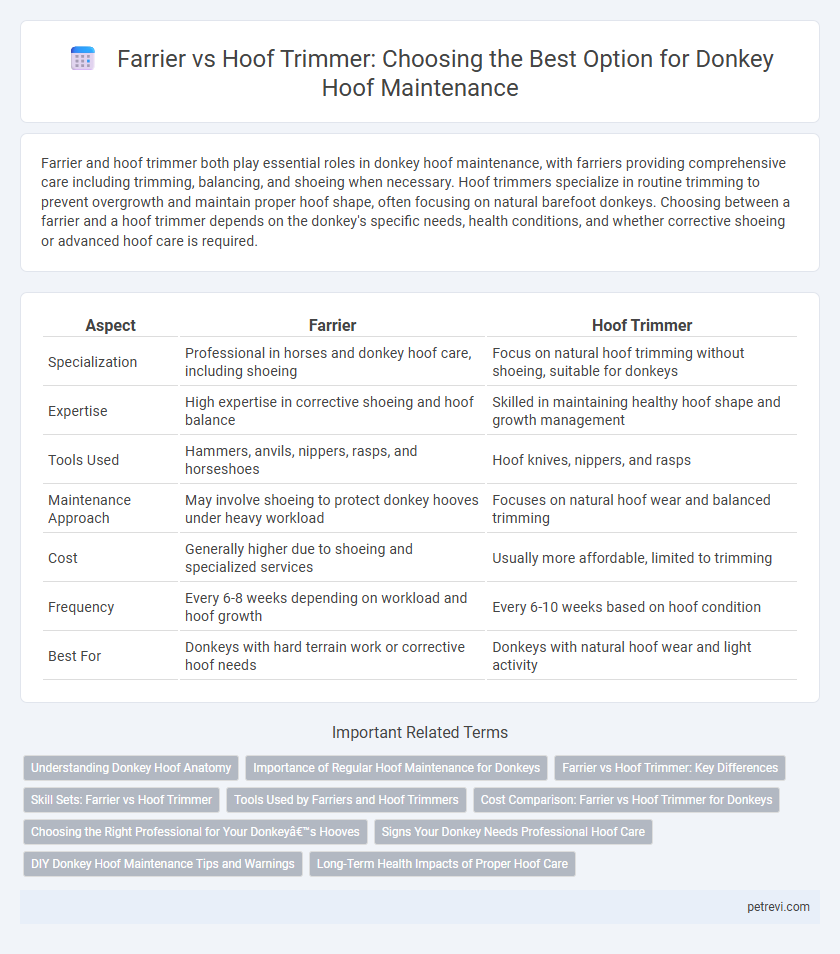Farrier and hoof trimmer both play essential roles in donkey hoof maintenance, with farriers providing comprehensive care including trimming, balancing, and shoeing when necessary. Hoof trimmers specialize in routine trimming to prevent overgrowth and maintain proper hoof shape, often focusing on natural barefoot donkeys. Choosing between a farrier and a hoof trimmer depends on the donkey's specific needs, health conditions, and whether corrective shoeing or advanced hoof care is required.
Table of Comparison
| Aspect | Farrier | Hoof Trimmer |
|---|---|---|
| Specialization | Professional in horses and donkey hoof care, including shoeing | Focus on natural hoof trimming without shoeing, suitable for donkeys |
| Expertise | High expertise in corrective shoeing and hoof balance | Skilled in maintaining healthy hoof shape and growth management |
| Tools Used | Hammers, anvils, nippers, rasps, and horseshoes | Hoof knives, nippers, and rasps |
| Maintenance Approach | May involve shoeing to protect donkey hooves under heavy workload | Focuses on natural hoof wear and balanced trimming |
| Cost | Generally higher due to shoeing and specialized services | Usually more affordable, limited to trimming |
| Frequency | Every 6-8 weeks depending on workload and hoof growth | Every 6-10 weeks based on hoof condition |
| Best For | Donkeys with hard terrain work or corrective hoof needs | Donkeys with natural hoof wear and light activity |
Understanding Donkey Hoof Anatomy
Donkey hoof anatomy features a more upright and concave sole compared to horses, requiring specialized care tailored to their unique growth patterns and structure. Farriers use traditional methods like shoeing and trimming to support weight distribution, while hoof trimmers focus on natural trimming to maintain hoof balance without shoes. Understanding the donkey's hoof morphology, including the thicker frog and softer hoof wall, is essential for choosing appropriate maintenance techniques that prevent lameness and promote healthy hoof development.
Importance of Regular Hoof Maintenance for Donkeys
Regular hoof maintenance is crucial for donkeys to prevent common issues such as cracks, infections, and lameness. Farriers bring specialized skills for trimming and shoeing, addressing structural problems and ensuring proper hoof balance. Hoof trimmers provide routine care to maintain healthy hoof shape, promoting comfort and mobility essential for donkey well-being.
Farrier vs Hoof Trimmer: Key Differences
Farriers specialize in shoeing and correcting hoof imbalances through trimming and nailing shoes, offering medical interventions tailored to donkey hoof health. Hoof trimmers focus primarily on routine maintenance, removing excess hoof growth and smoothing edges to prevent cracking or splitting. Choosing between a farrier and a hoof trimmer depends on the donkey's specific hoof needs, with farriers addressing more complex structural issues and hoof trimmers managing regular upkeep.
Skill Sets: Farrier vs Hoof Trimmer
Farriers possess advanced skills in horseshoeing, including precise hoof trimming, balancing, and applying shoes tailored to a donkey's unique hoof structure, which is crucial for correcting gait and preventing lameness. Hoof trimmers primarily focus on routine maintenance, maintaining proper hoof shape and length to promote natural wear and overall hoof health without specialized shoeing knowledge. The farrier's expertise extends to diagnosing hoof diseases and biomechanical issues, while hoof trimmers typically handle non-specialized care on a regular schedule.
Tools Used by Farriers and Hoof Trimmers
Farriers use specialized tools such as nippers, rasps, clinchers, and hoof knives to carefully trim, shape, and shoe donkey hooves, ensuring proper balance and protection. Hoof trimmers typically rely on nippers, rasps, and knives, focusing primarily on trimming without shoeing, which requires less extensive equipment. The choice of tools directly impacts the precision and outcome of hoof maintenance tailored to the unique needs of donkeys.
Cost Comparison: Farrier vs Hoof Trimmer for Donkeys
Farrier services for donkey hoof maintenance typically range between $50 to $150 per visit, reflecting specialized skill in shoeing and corrective trimming. Hoof trimmers offer a more cost-effective option, with prices generally between $30 and $75 per session, focusing primarily on basic hoof care without shoeing. Choosing between a farrier and a hoof trimmer depends on the donkey's hoof condition and specific care requirements, balancing cost with the level of expertise needed.
Choosing the Right Professional for Your Donkey’s Hooves
Selecting the right professional for your donkey's hoof maintenance is crucial for its overall health and mobility. Farriers offer specialized expertise in trimming, shaping, and shoeing hooves, essential for donkeys with specific hoof issues or those requiring protective footwear. Hoof trimmers provide routine maintenance through natural trimming techniques, ideal for donkeys with healthy hooves kept in natural environments.
Signs Your Donkey Needs Professional Hoof Care
Detecting signs that your donkey requires professional hoof care involves monitoring for cracks, overgrown hooves, and uneven wear, which can indicate discomfort or potential lameness. Noticeable changes in gait, reluctance to walk, or swelling around the hoof are critical indicators signaling the need for a farrier or hoof trimmer's intervention. Regular inspections focusing on odor, heat, and hoof softness help identify infections or abscesses, ensuring timely and effective maintenance tailored to donkey hoof health.
DIY Donkey Hoof Maintenance Tips and Warnings
Regular hoof maintenance is essential for donkey health, and choosing between a farrier and a hoof trimmer depends on your skill level and the donkey's specific needs. Farriers provide professional, corrective hoof care, especially for complex issues, while hoof trimmers are suitable for routine trimming to prevent overgrowth. DIY donkey hoof maintenance requires proper tools, regular inspection for cracks or infections, and caution to avoid causing pain or injury during trimming.
Long-Term Health Impacts of Proper Hoof Care
Proper hoof care is essential for maintaining a donkey's long-term health, as neglect can lead to chronic lameness and joint problems. Farriers provide expert hoof trimming combined with shoeing, which supports structural integrity and can alleviate pressure on compromised hooves. Hoof trimmers offer regular maintenance focusing on natural hoof wear, promoting circulation and preventing infections, crucial for donkeys in softer or more natural terrains.
Farrier vs Hoof Trimmer for Donkey Hoof Maintenance Infographic

 petrevi.com
petrevi.com